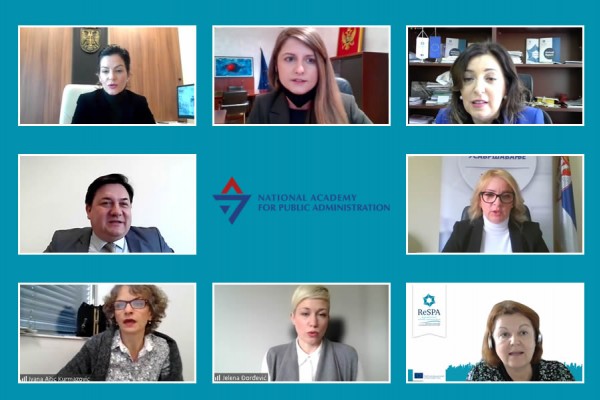
Presentation of "National Academy for Public Administration of the Republic of Serbia (NAPA)" at HRMD Working group meeting
Ms Ratka Sekulović, ReSPA Director ,Ms Marija Obradović, the Minister of Public Administration and Local Self-Government, Republic of Serbia, Ms Tamara Srzentić, Minister of Public Administration, Digital Society and Media of Montenegro, Mr Dejan Miletić, Director of National Academy for Public Administration, NAPA managerial staff, members of the ReSPA HRMD working group as well as prominent guests from the French Republic working as advisors in PAR and EU integration within WB governments attended the HRMD Working group meeting held online on 16 March 2021.
The meeting provided a floor for NAPA's presentation from its establishment to programme preparation and implementation, learning management system, international cooperation and projects, visibility and communication, to innovative training approaches. NAPA shared their know-how with more than 50 colleagues from the region. Learning from the example of Serbia may help other countries that plan to establish national academies (Montenegro, North Macedonia).
At her opening speech, Minister Obradović expressed her satisfaction with the ReSPA WG members' great interest in NAPA, the modern house of knowledge for all civil servants in the Republic of Serbia. Ms Obradović underlined that investing in human resources is one of the most critical investments for implementing all reform processes. Thus, MPALSG through NAPA aims to provide professional development equally available to all public servants, bot at the national and local level. NAPA has trained many public servants through the most innovative and standardised training approaches. In 2020, due to the Covid pandemic, NAPA organised an e-learning platform and gained a record number of more than 11.600 attendees. With strong support from the MPALSG, NAPA will continue developing its training programmes. Gradually, it will become a knowledge management centre devoted to empowering all public servants in the Republic of Serbia.
Minister Srzentić shared her personal experience while working in the California Office of Innovation and presented how the California State Government developed a civil servants training program. Ms Srzentic also highlighted the privilege to partner with ReSPA and, through its activities, to collaborate with public servants from across Western Balkan's ministries. Being aware that people are the government's heart, she has been working with partner ministries to introduce new practices, processes, and methods of designing, delivering, and operating programs and services that meet people's needs from the start.
Ms Ratka Sekulović, ReSPA Director, welcomed attendees and expressed her satisfaction in establishing fruitful collaboration between ReSPA, MLPSG and NAPA in the previous period and expressed her expectation in strengthening further cooperation. She also emphasised the importance of depoliticisation and professionalisation of the civil servants in the WB public administration as one of the prerequisites in the EU accession negotiation process. Hence, within the HRMD Working Group, ReSPA will continue to support WB public administrations to have professional, competent and citizen-oriented public servants. She finally expressed her expectation that today's NAPA presentation will inspire other countries to establish similar institutions within their relevant ministries.
NAPA managerial staff presented NAPA's establishment focusing on its legal framework, organisational structure, programme preparation and implementation by presenting training programmes for civil servants realised on a central and local level and highlighting innovative training approaches.
Finally, Mr Enzo Caputo, ReSPA expert, introduced the participants to the ReSPA Monitoring toolkit and methodology and the role that HRMD WG members will have during the first ReSPA monitoring exercise.



